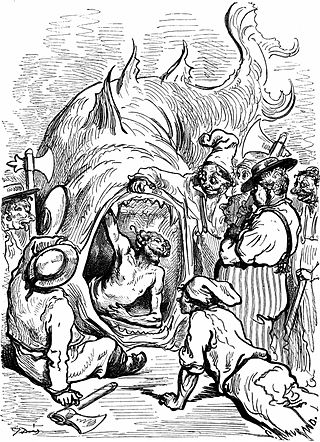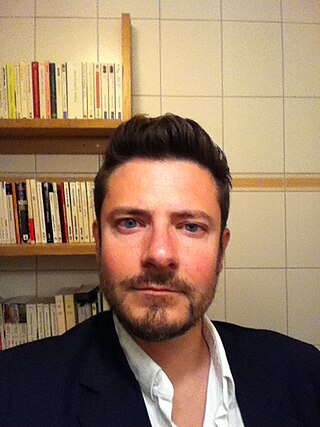Related Research Articles

Rhetoric is the art of persuasion. It is one of the three ancient arts of discourse (trivium) along with grammar and logic/dialectic. As an academic discipline within the humanities, rhetoric aims to study the techniques that speakers or writers use to inform, persuade, and motivate their audiences. Rhetoric also provides heuristics for understanding, discovering, and developing arguments for particular situations.

An unreliable narrator is a narrator whose credibility is compromised. They can be found in fiction and film, and range from children to mature characters. The term was coined in 1961 by Wayne C. Booth in The Rhetoric of Fiction. While unreliable narrators are almost by definition first-person narrators, arguments have been made for the existence of unreliable second- and third-person narrators, especially within the context of film and television, and sometimes also in literature.

Wayne Clayson Booth was an American literary critic and rhetorician. He was the George M. Pullman Distinguished Service Professor Emeritus in English Language & Literature and the College at the University of Chicago. His work followed largely from the Chicago school of literary criticism.
Narratology is the study of narrative and narrative structure and the ways that these affect human perception. It is an anglicisation of French narratologie, coined by Tzvetan Todorov. Its theoretical lineage is traceable to Aristotle (Poetics) but modern narratology is agreed to have begun with the Russian formalists, particularly Vladimir Propp, and Mikhail Bakhtin's theories of heteroglossia, dialogism, and the chronotope first presented in The Dialogic Imagination (1975).

Ethos is a Greek word meaning 'character' that is used to describe the guiding beliefs or ideals that characterize a community, nation, or ideology; and the balance between caution, and passion. The Greeks also used this word to refer to the power of music to influence emotions, behaviors, and even morals. Early Greek stories of Orpheus exhibit this idea in a compelling way. The word's use in rhetoric is closely based on the Greek terminology used by Aristotle in his concept of the three artistic proofs or modes of persuasion alongside pathos and logos. It gives credit to the speaker, or the speaker is taking credit.

Aristotle's Rhetoric is an ancient Greek treatise on the art of persuasion, dating from the 4th century BCE. The English title varies: typically it is Rhetoric, the Art of Rhetoric, On Rhetoric, or a Treatise on Rhetoric.
Edward P.J. Corbett was an American rhetorician, educator, and scholarly author. Corbett chaired the 1970 Conference on College Composition and Communication, and was chair of the organization and a member of the National Council of Teachers of English Executive Committee in 1971. He was also chair of the Rhetoric Society of America from 1973 to 1977. From 1974 to 1979, he was editor of the journal College Composition and Communication. He is known for promoting classical rhetoric among composition scholars and teachers.

Rhetoric of science is a body of scholarly literature exploring the notion that the practice of science is a rhetorical activity. It emerged after a number of similarly oriented topics of research and discussion during the late 20th century, including the sociology of scientific knowledge, history of science, and philosophy of science, but it is practiced most typically by rhetoricians in academic departments of English, speech, and communication.
Monika Fludernik, a native Austrian, is professor of English literature and culture at the Albert Ludwigs University of Freiburg, Germany.
Brian G. McHale is a US academic and literary theorist who writes on a range of fiction and poetics, mainly relating to postmodernism and narrative theory. He is currently Distinguished Humanities Professor of English at Ohio State University. His area of expertise is Twentieth-Century British and American Literature.
The Ohio State University Press is the university press of The Ohio State University. It was founded in 1957.
Ann Banfield, is a professor Emeritus of English at the University of California, Berkeley.
Marie-Laure Ryan is an independent literary scholar and critic. She has written several books and articles on narratology, fiction, and cyberculture and has been awarded several times for her work. She attended the University of Geneva to study literature as an undergraduate, before moving to the United States in 1968. attending graduate school at the University of Utah, where she received her M.A. in Linguistics and German, alongside a Ph.D in French. She later obtained a Bachelor's degree in Computer Science from the University of California San Diego.

Raphaël Baroni is a Swiss narratologist. He is an associate professor in the Department of French as a foreign language at the University of Lausanne. He is mainly interested in the analysis of narrative time, plot, tellability, and sequence, in relation with narrative interest and transmedial analysis. He is the author of La tension narrative. As summarized by Emma Kafalenos, in this book, Baroni emphasizes that:

Jakob Lothe is a Norwegian literary scholar and Professor of English literature at the University of Oslo.
Robyn R. Warhol is an American literary scholar, associated in particular with feminist narrative theory, of which she is considered one of the originators. She is currently an Arts and Humanities Distinguished Professor of English at the Ohio State University and a core faculty member of Project Narrative. Warhol received her BA in English from Pomona College in 1977 and her PhD in English and American Literature from Stanford University in 1982, where she studied with Thomas Moser, George Dekker, and Ian Watt.

Philosophy & Rhetoric is a quarterly peer-reviewed academic journal covering rhetorical theory, ethics, continental philosophy, informal logic, argumentation theory, critical social theory, and political theory. It is published by Penn State University Press and was established in 1968. The editor-in-chief is Erik Doxtader. The journal was established in 1968 by Henry Johnstone Jr. and Carroll Arnold, who saw a need for a journal that would, among other things, investigate "rhetoric as a philosophical concept".
The Journal of Narrative Theory is a triannual peer-reviewed academic journal covering narratology in literary fiction. The journal was established in 1971 as the Journal of Narrative Technique and obtained its current title in 1999. It is published by the Department of English at Eastern Michigan University and the editors-in-chief are Abby Coykendall and Andrea Kaston Tange. In An Introduction to Narratology, Monika Fludernik lists it as one of "the most important journals in the field".
Gerald J. Prince is an American academic and literary theoretician. He is Professor of Romance Languages at the University of Pennsylvania, where he is also affiliated with department of Linguistics and the Program in Comparative Literature, and with the Annenberg School for Communication.

Feminist rhetoric emphasizes the narratives of all demographics, including women and other marginalized groups, into the consideration or practice of rhetoric. Feminist rhetoric does not focus exclusively on the rhetoric of women or feminists, but instead prioritizes the feminist principles of inclusivity, community, and equality over the classic, patriarchal model of persuasion that ultimately separates people from their own experience. Seen as the act of producing or the study of feminist discourses, feminist rhetoric emphasizes and supports the lived experiences and histories of all human beings in all manner of experiences. It also redefines traditional delivery sites to include non-traditional locations such as demonstrations, letter writing, and digital processes, and alternative practices such as rhetorical listening and productive silence. According to author and rhetorical feminist Cheryl Glenn in her book Rhetorical Feminism and This Thing Called Hope (2018), "rhetorical feminism is a set of tactics that multiplies rhetorical opportunities in terms of who counts as a rhetor, who can inhabit an audience, and what those audiences can do." Rhetorical feminism is a strategy that counters traditional forms of rhetoric, favoring dialogue over monologue and seeking to redefine the way audiences view rhetorical appeals.
References
- ↑ Phelan, James (2005). Living To Tell About It: A Rhetoric And Ethics Of Character Narration (Paperback). ISBN 0801489288.
- ↑ Shen, Dan (May 2013). "Implied Author, Authorial Audience, and Context: Form and History in Neo-Aristotelian Rhetorical Theory". Narrative . Ohio State University Press. 21 (2): 151. doi:10.1353/nar.2013.0006. JSTOR 24615418. S2CID 143582967.
- ↑ Shen, Dan (2017). "'Contextualized Poetics' and Contextualized Rhetoric: Consolidation or Subversion?". In Jannidis, Fotis; Martínez, Matías; Pier, John; Schmid, Wolf (eds.). Emerging Vectors of Narratology. Vol. 57. De Gruyter. p. 15. ISBN 978-3-11-055378-9.
- ↑ Fludernik, Monika (2009). "A theory of narrative". An Introduction to Narratology. Routledge. p. 11. ISBN 978-0-203-88288-7.
- ↑ Shen, Dan (2017). "Unreliability". In Hühn, Peter; Pier, John; Schmid, Wolf; Schönert, Jörg (eds.). Handbook of Narratology. Vol. 2. De Gruyter. p. 896. ISBN 978-3-11-038207-5.
- ↑ "The Ohio State University Press". The Ohio State University Press. Archived from the original on 2009-12-09. Retrieved 2009-12-19.
- ↑ "David Herman". Ohio State University Department of English. Archived from the original on 2010-01-13. Retrieved 2009-12-19.
- ↑ "Project Narrative". Ohio State University College of Humanities. Retrieved 2009-12-19.